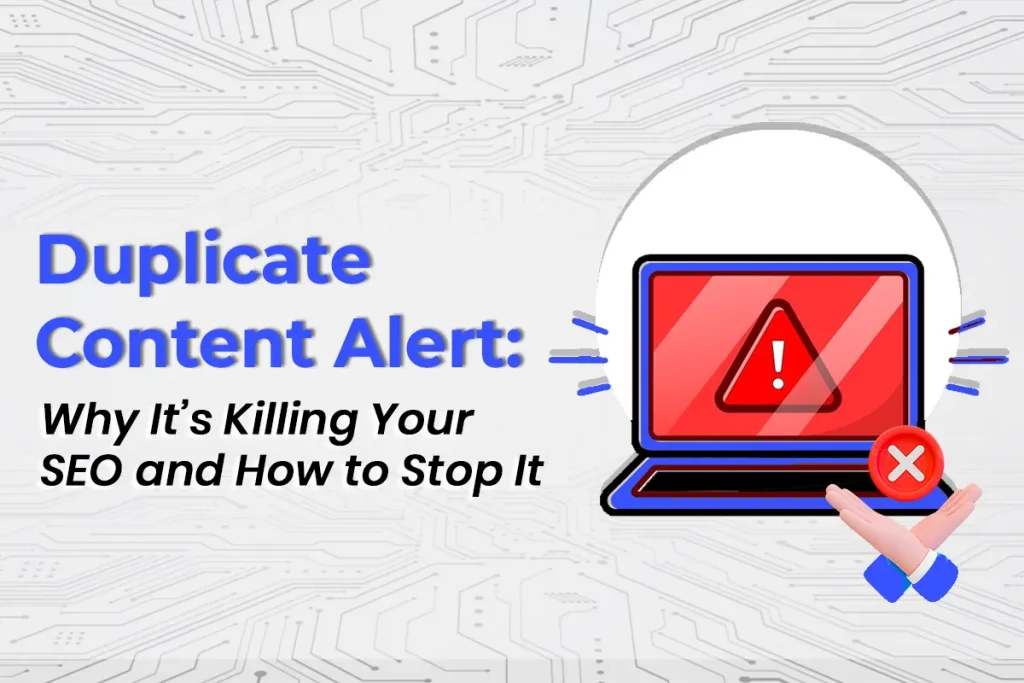Duplicate content: what is it, and why is it killing your SEO? While it may seem harmless at first, duplicate content can worsen user experience, waste your SEO efforts, and prevent your pages from ranking high on SERPs! Let’s take a look at the problems caused by duplicate content and how SEO agencies find and fix it.
What is Duplicate Content?
Duplicate content is content on your website (and external websites) that is identical or similar. These may include product descriptions, blog posts you’ve published on external websites, multiple service pages with similar content, category pages and product pages, etc.
How Duplicate Content is Killing Your SEO
Duplicate content is killing your SEO—and you don’t even know it.
Indexing Issues
If a search engine sees multiple pages with similar content on your website, it gets confused and doesn’t know which to show to a search query. As a result, it may not end up indexing any of them, making you lose out on potential SERP rankings.
Visibility Loss
Imagine this: you have three similar pages, A, B, and C. Of these pages, page A is the best optimized for the keyword you want to rank for. A search engine crawls your website and indexes C instead of A. Since C is not optimized for your desired keyword, it doesn’t rank on SERPs like A would have.
In this scenario, all the link equity and authority that page C receives is useless. Furthermore, you have wasted your efforts on optimizing page A. Letting search engines decide which of your duplicate pages it should crawl lowers your website’s visibility.
Wasted Crawl Budget
A crawl budget is the number of pages a search engine will ‘crawl’ on a website within a specific timeframe. When search engine crawlers waste time indexing duplicate pages, important pages may be indexed later or not at all.
Additionally, Google might ultimately decide to stop crawling such websites or lower their crawl budget (since it’s being wasted on crawling duplicate pages).
Lower Organic Traffic
Duplicate content fails to provide value to users by showing them undesirable, unoptimized pages in search engine results. When search engines index the wrong pageit results in lower organic traffic.
Poor User Experience
Duplicate content can confuse users, make site navigation more difficult, make your site appear unprofessional, and make it harder to find relevant information, which increases your website’s bounce rates.
Decreased Click-Through and Conversion Rates
When a search engine automatically chooses a poorly optimized page to display to users, it can harm your click-through rate. When your users land on a non-optimized product page, your conversion rate may suffer.
Diluted Link Value
Duplicate content that doesn’t specify a canonical link can cause link juice to get diluted, as it has to be split evenly between all duplicate pages. If you’re not careful, syndicated content on external websites can start outranking your original pages!
Solutions To Prevent Duplicate Content
Duplicate content, when used correctly, shouldn’t cause any SEO problems. Here’s how you can fix the above issues:
1. Create Unique Content
Writing unique content helps you avoid creating duplicate pages. If possible, consolidate duplicate or similar pages into a single, concise, and well-thought-out page. For similar pages, tailor each page to fit its specific purpose and try to make them as different as possible.
Using unique product descriptions can really improve SEO results. Consider using content writing services and adding customized sections to each location or product page to distinguish them from one another.
2. Use 301 Redirects
If you have duplicate pages that you no longer use, add a 301 redirect to them. It tells search engines that the page has permanently moved to a new location and the older one is no longer in use. 301 redirects also allow you to pass the older page’s ranking power and link juice to the new page.
3. Add Canonical Tags
Canonical tags are HTML snippets that tell search engines which page is the preferred version for indexing. If you add a canonical tag to the page you want to rank, all the cumulative backlink value of duplicate pages will be transferred to that page.
4. Add Noindex Tags
Certain duplicate pages, like tag or category pages, serve no SEO purpose but can improve the user experience. Meta robots noindex tags tell search engines not to index such pages and, as a result, prevent them from showing up in SERPs
Noindex tags can be used for confirmation pages, your website’s search result pages, and pages that you cannot add a redirect or canonical link to.
5. Follow a Content Syndication Strategy
While syndicating content to other websites, always ensure that they’re linking back to your original pages. Always attribute and link back to the source, and set your original content as the canonical URL.
Stop Duplicate Content From Killing Your SEO
Duplicate content can have many long-term implications for your SEO survival. When left unoptimized, duplicate pages lower your backlink value, waste crawl budget, and make you lose precious SERP rankings and visibility.
Trying to fix duplicate content issues yourself can be tricky and time-consuming. With a comprehensive content strategy and some solid SEO knowledge, an SEO agency like Apex Infotech can fix any duplicate content issues on your website quickly and conveniently.
Frequently Asked Questions:
Can duplicate content earn my site a penalty?
No, duplicate content is not penalized. Google doesn’t penalize duplicate content, but it can cause SEO issues if left unoptimized.
Is duplicate content the same as plagiarized content?
Duplicate content is when similar content appears on multiple URLs, whether intentional or unintentional. Plagiarized content is copying content from other websites and passing it off as your own.
Which tools should I use to detect duplicate content on my website?
You can search for duplicate content on your website through Google Search Console and by using paid tools like SEMrush and Screaming Frog.
How does duplicate content lower your rankings?
When a search engine sees multiple similar/duplicate pages, it selects whichever one it thinks is the most authoritative to index. This page prevents more important and optimized pages from ranking by absorbing backlinks and wasting crawl budget.



